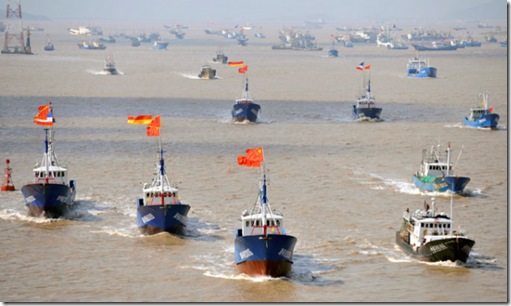Unless you have had your head stuck in the sand the last decade you are aware the global conflicts that are primarily centered on Islamic terrorism and Muslim nation saber rattling primarily against Israel yet definitely with America included, is evidence that planet earth will experience another World War.
Now wouldn’t it be surprising that a conflict between China and Japan in the 21st century might start the war snowball to roll?
JRH 9/19/12
****************************
How close are Japan and China to war?
September 19, 2012
What should have been a fairly traditional, if uncomfortable, round of protests and counter-demonstrations in China and Japan over ownership of the Senkaku Islands is in danger of spiraling out of control. The islands sit off the northeast tip of Taiwan and are close to massive undersea oil and gas deposits. They have been administered by Tokyo since 1972 (as part of the reversion of Okinawa to Japanese control), but Japan, China, and Taiwan all claim ownership. Activists from both China and Japan have landed on the islands in recent weeks, sparked by Tokyo’s decision to purchase the islands from their private Japanese owners. This has led to massive protests across China and the targeting of Japanese diplomatic missions and businesses. Now, a number of Japan’s largest companies that do business in China are temporarily suspending operations, including Mazda, Uniqlo, and Aeon department stores. Others are the target of a coordinated boycott campaign.
That is not enough to bring about conflict, but actions in the waters off the Senkakus just might be. Last week, China sent six maritime patrol ships to the islands, where they were confronted by Japan’s Coast Guard. Most withdrew quickly, and those that remained left a day later. Now, China is upping the ante by sending eleven patrol ships back to the disputed waters. On top of that, a massive flotilla of up to 1,000 Chinese fishing boats is supposedly on its way to the islands as well. It is, in fact, Chinese fishing boats that are the cause of most of the tensions between China and its maritime neighbors in Asia. They enter contested waters to fish, and are invariably backed up by maritime patrol boats. This is what triggered a month-long standoff between the Philippines and China earlier this year in the South China Sea, and what caused a diplomatic crisis between Beijing and Tokyo over the Senkakus back in 2010.
Beijing continually tries to push the envelope, seeing how far other nations will go in protecting their territory (or, in China’s view, contested territory). In no cases of which I’m aware has Beijing reined in Chinese fishermen in order to contain tension. Instead, in almost every instance, it inflames such situations by sending in its patrol ships to back up the fishermen. Even those who are skeptical that China is really a menace to its neighbors would have trouble defending these increasingly aggressive actions.
Now Japan and China may be just one step away from a shooting incident. When the top political commissar of the People’s Liberation Army is reported as talking about the need to prepare for war with Japan, it may well be more than words. If the 1,000 fishing ships actually do attempt to enter the Senkakus, there is no way the Japanese Coast Guard can intercept them all, and another Chinese captain may decide to ram a Japanese vessel, as happened in 2010, precipitating the previous crisis. This time, though, the Japanese will be under intense pressure to take stronger action to avoid being seen as impotent. But, with nearly a dozen Chinese patrol vessels, some of which may be armed, on the scene, any attempt to assert Japanese authority in the Senkakus could wind up with shots being fired across the bows — or worse — of either Chinese or Japanese ships.
The odds are that all this will pass without incident. But each time, China forces itself and Japan to dance closer and closer to the edge. One day, they may tumble over, and nationalist passions, especially in China, may ensure some level of conflict. That, of course, raises the question of just what the United States would do to protect its ally and restore peace. So far, Washington is bending over backward to appear neutral. That may send just the wrong message to a Chinese leadership that either doesn’t understand the danger it is courting or is willing to risk major confrontation for very little reason. Sometimes, common sense can only be restored by some straight talking that makes clear what the consequences would be to China of any actions they take that rupture East Asia’s uneasy peace.
___________________________________
©2012 American Enterprise Institute for Public Policy Research
AEI History Excerpt:
The arrival in 1954 of William J. Baroody marked the beginning of the modern AEI. The son of a Lebanese immigrant stonecutter, Mr. Baroody gave up a secure job at the US Chamber of Commerce for the chance to lead a small, financially strapped organization. He was an entrepreneur and risk-taker, a strong political conservative and a widely read intellectual convinced of the potential for ideas to move practical politics. During his 26 years at AEI, he demonstrated singular gifts for spotting important academic talent and for promoting dense—and often contrarian—policy-reform ideas for busy public officials, business executives and journalists. Mr. Baroody expanded the legislative analyses, commissioned original research by leading scholars and raised the money to pay the bills. Within a year of his arrival, reviews and excerpts of AEA publications began appearing in The Wall Street Journal and Barron's. By the early 1960s, economists Milton Friedman, Paul McCracken and Gottfried Haberler had joined his academic advisory board. Mr. Baroody conceived for AEI a brilliant slogan that combined the Institute's commitment to freedom and competition with a forthright challenge to the liberal orthodoxy of 1960s Washington: "Competition of ideas is fundamental to a free society." READ ALL OF IT

No comments:
Post a Comment